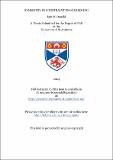Symmetry in constraint programming
Abstract
Constraint programming is an invaluable tool for solving many of the complex NP-complete problems that we need solutions to. These problems can be easily described as Constraint Satisfaction Problems (CSPs) and then passed to constraint solvers: complex pieces of software written to solve general CSPs efficiently. Many of the problems we need solutions to are real world problems: planning (e.g. vehicle routing), scheduling (e.g. job shop schedules) and timetabling problems (e.g. staff rotas) to name but a few. In the real world, we place structure on objects to make them easier to deal with. This manifests itself as symmetry. The symmetry in these real world problems make them easier to deal with for humans. However, they lead to a great deal of redundancy when using computational methods of problem solving. Thus, this thesis examines some of the many aspects of utilising the symmetry of CSPs to reduce the amount of computation needed by constraint solvers. In this thesis we look at the ease of use of previous symmetry breaking methods. We introduce a new and novel method of describing the symmetries of CSPs. We look at previous methods of symmetry breaking and show how we can drastically reduce their computation while still breaking all symmetry. We give the first detailed investigation into the behaviour of breaking only subsets of all symmetry. We look at how this affects the performance of constraint solvers before discovering the properties of a good symmetry. We then present an original method for choosing the best symmetries to use. Finally, we look at areas of redundant computation in constraint solvers that no other research has examined. New ways of dealing with this redundancy are proposed with results of an example implementation which improves efficiency by several orders of magnitude.
Type
Thesis, PhD Doctor of Philosophy
Collections
Items in the St Andrews Research Repository are protected by copyright, with all rights reserved, unless otherwise indicated.

